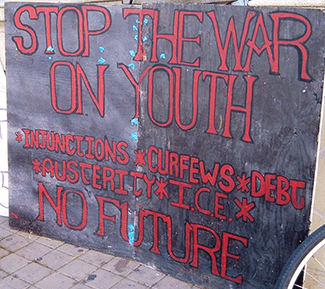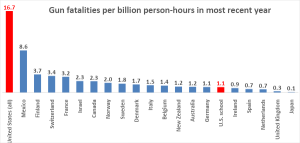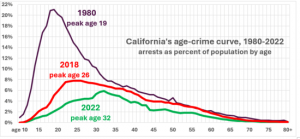Welcome to YouthFacts
We Are Debunkers
YouthFacts is dedicated to providing factual information on youth issues –- crime, violence, sex, drugs, drinking, social behaviors, education, civic engagement, attitudes, media, whatever teen terror du jour arises. Since we emphasize demonstrable fact over teen-bashing emotionalism and interest-driven propaganda, the information you find here will be dramatically different than in the major media and political forums.
Example: The truth about school shootings no one talks about
Here are the unvarnished facts about United States school shootings leaders, interest groups, and major media on all sides refuse to engage, because they demolish everyone’s arguments:
1. Even in the worst year for school shootings – even with the Uvalde, Sandy Hook, Parkland, etc. school massacres – a student in an American primary or secondary (K-12) school is safer from being shot than a person in Germany.
2. One 64-year-old shot more people in Las Vegas in 15 minutes than are shot in all 131,000 American schools in four years.
3. A student would have to attend school every school day for 400 years to risk having any kind of shooting (homicide, accident, fatal, non-fatal) anywhere in their school, and for over 200,000 years before risking being fatally shot in or on the grounds of a school.
4. We should be far more frightened when a student leaves school, especially if they are going home, where they are many times more likely to be shot.
5. Why are schools so uniquely safe from gun violence? Because (a) they are heavily occupied by young populations singularly unlikely to shoot themselves or others, and (b) nearly all are gun-free.
6. Why do interest groups on all sides demonize schools as bullet-riddled places students should be terrified to enter? Because all sides choose exploit fears of youth to advance their agendas even at the expense of making schools more dangerous. The rampant hysteria gun-control lobbies create about schools fuels the crazed impetus by gun-rights groups to arm school personnel and officers -a reckless policy that has already caused more school shootings.
The YouthFacts study uses standard Centers for Disease Control, FBI, Education Department, and demographic data to compare the worst recent year for school shootings with gun violence risks elsewhere in American society and other nations, adjusted for the time youths and adults actually spend in those places. Its conclusions are straightforward and factual – and therefore startling and challenging to America’s grossly deceptive gun debate.
As teen crime plunges, “juvenile justice” interests resurrect crude 19th- century racism
The juvenile system’s crisis can be summed up in FBI tabulations of arrests of persons under age 18 for criminal offenses:
- 1995: 2,343,000
- 2022: 408,000
Today, far fewer youths than middle-agers in their 50s are being arrested – a mule-kick to the gut of fossilized notions of crime. Adjustments for FBI crime coverage and youth population growth enhance the astounding teenage crime plunge still more.
No one ever imagined that as America’s teenage population grew and went from heavily White to majority of Color (Latinx, Black, Asian, Native, and other Nonwhite), crime and violence would plummet as never before. In fact, experts had predicted the opposite: a generation of Clockwork-Orange-like “teenage super-predators” marauding cities and countryside alike.
Never have experts been so wrong. Now, the 25-year crash in teenage crime – down an astounding 87% in just one generation – is an existential threat to hordes of academics, officers, corporations, agencies, and advocates dependent on masses of youths shooting, robbing, and stealing.
Youth Facts Contributors
Professor Anthony Bernier teaches youth services at the nation’s largest library school (San Jose State University’s School of Information) and is Project Director for and blogs at YouthFacts.org. He lives in Eugene, Oregon, and rides a Vespa P200E and a BMW C650GT.
Mike Males is senior researcher for the Center on Juvenile and Criminal Justice, San Francisco; formerly taught sociology, psychology, and epidemiology at the University of California, Santa Cruz, and Irvine; and has authored four books and scores of journal articles and op-eds on youth and social topics. He lives in Auburn, California, and writes weird futuristic fiction.
Mike Males’ carefully documented Substack posts confront myths about teens and social media, including the shocking fact that Centers for Disease Control surveys show access to social media actually prevents suicide attempts and serious injury among both younger and older teens by connecting them to others. See recent posts here
Wendy Schaetzel Lesko‘s experiences as a community organizer and journalist are woven into several of her books including Youth! The 26% Solution. After two decades with the Youth Activism Project, now Wendy leadsYouth Infusion which focuses on adult-run nonprofits and government agencies that engage teens as co-strategists in many organizational operations.
Tori Puente is an MLIS student at San Jose State University, focusing on archives and digital curation. She is a current member of the American Library Association (ALA) and Society of American Archivists (SAA) student chapters. Tori lives in Los Angeles with her cat and dog.
New Blog Posts
Going Public “For Real” White young people just walked in the front door of the Greenville, South Carolina, main library in 1959. Not so for 18 year old Jesse Jackson (1941-2026). The books Jackson wanted to read during his freshman Christmas break from University of Illinois took a lot more. By Anthony Bernier, March 2026
Generation Z’s real social media sin has nothing to do with “mental health” Allied government/Big-Tech powers pushing censorship, mass surveillance, and repression target teenagers and online freedom. But those are just the beginning. Their larger goals are truly terrifying. By Mike Males, February 2026
Authorities are recasting young people’s concerns about climate change, Gaza, social justice, family crises, etc., as “mental illness” Let’s start with the clueless condescension, because it gets scarier.
National Public Radio’s 1A (First Amendment)’s lengthy 12/18 “Navigating modern adolescence” managed to dodge ALL the family, community, economic, and global issues teenagers tell major surveys are their biggest worries. By Mike Males, January 2026
Social media isn’t driving the teenage “loneliness epidemic” Americans of all ages suffer a “loneliness epidemic,” former Surgeon General Vivek Murthy announced in 2023, fostering health damage rivaling smoking “15 cigarettes a day.”
“In recent years, about one-in-two adults in America reported experiencing loneliness,” Murthy lamented. “Across many measures, Americans appear to be becoming less socially connected over time… Instead of coming together, we will further retreat to our corners—angry, sick, and alone.”
Well, that’s dark. We’d better remedy why we’re lonelier. By Mike Males, January 2026
Election Lessons for Every Organization Profound lessons emerge from Zohran Mamdani’s victory even though NYC is unlike any other city. A historic turnout and a whopping 78 percent of those under age 30 voted for Zohran Mamdani. Sure, he is young, energetic, and charismatic, but I believe there is a broader conclusion that is relevant to any organization that recognizes the irreplaceable value of the rising generations. By Wendy Schaetzel Lesko, January 2026
One more – really bad – emblem of progressive podcasts’ grotesque hate speech toward young people The fervent concern over girls’ mental health mysteriously vanishes when shocking realities – including from the Centers for Disease Control – challenge official dogmas. By Mike Males, December 2025
Top Posts From Mike’s Substack



